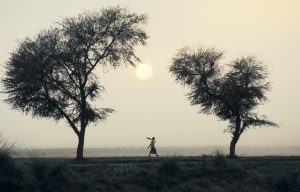An Indian scientist based in Switzerland researches how plants and microbes get enough iron from their environments, studies that could prove vital in meeting crucial environmental challenges. A scientist at the Department of Environmental Chemistry at the Swiss Federal Institute of Aquatic Science & Technology (EAWAG), Dr. Jagannath Biswakarma’s research highlights the critical mechanisms by which plants and microorganisms can acquire iron under necessary environmental conditions. His research looks into the soil and ecological conditions and how plants might need to adopt different iron strategies for their metabolic activities. This research is significant as South Asian countries face the brunt of environmental degradation, pollution, urbanization, and other pressures on the natural environment.
According to the World Bank, South Asia is one of the most vulnerable regions in the planet when it comes to climate change. In past decades, South Asian countries have faced significant disasters related to changes in climate. The World Bank report suggests that South Asia will continue to face such events if the countries do not take necessary steps as global temperature rises, affecting monsoon, flooding, cyclones, and tsunamis.
The research on plants and microbes obtaining iron will help South Asian countries mitigate such challenges.
Biswakarma and his colleagues at EAWAG and at the University of Vienna proposed mechanisms by which plants and microbes can acquire iron under environmentally dynamic conditions. Forbes recently featured Biswakarma’s research whose findings have bearing on the global South, where drastic changes in environments significantly affect agricultural productivity. Biswakarma’s research will help plant and agricultural scientists to answer questions related to iron deficiency.
Results of Biswakarma’s work have been published in many international peer-reviewed journals.
Biswakarma told The Diplomat, “I believe my research will help India and other South Asian countries to tackle agricultural productivity related to environmental changes.”
This research will help South Asian countries address the issue of deforestation and answer low agricultural output. It can also be revolutionary for high-altitude farmers and conservationists.
Biswakarma’s research also focuses on understanding the cycling of nutrients and contaminants in soil and natural waters and water treatment technologies to remove inorganic contaminants from drinking water.
With changing climate posing threat to South Asian countries, scientific research like Biswakarma’s will help governments and climate change groups understand soil patterns and iron deficiencies in plants. A bulging population, rapid urbanization, rising sea levels, deforestation, flooding, drinking water shortages, glacial melting, and threats to the Himalayas also mean it is high time to understand how trees will play a significant role in tackling these human-made disasters. Many of the world’s most polluted cities lie in South Asia. Perhaps once this pandemic is over, we would be served well by remembering that there are other, human-made, disasters, which equally needs addressing, with the use of scientific studies like this.
Arun Budhathoki is a Nepalese journalist, poet, and writer. He tweets at @arunbudhathoki

































